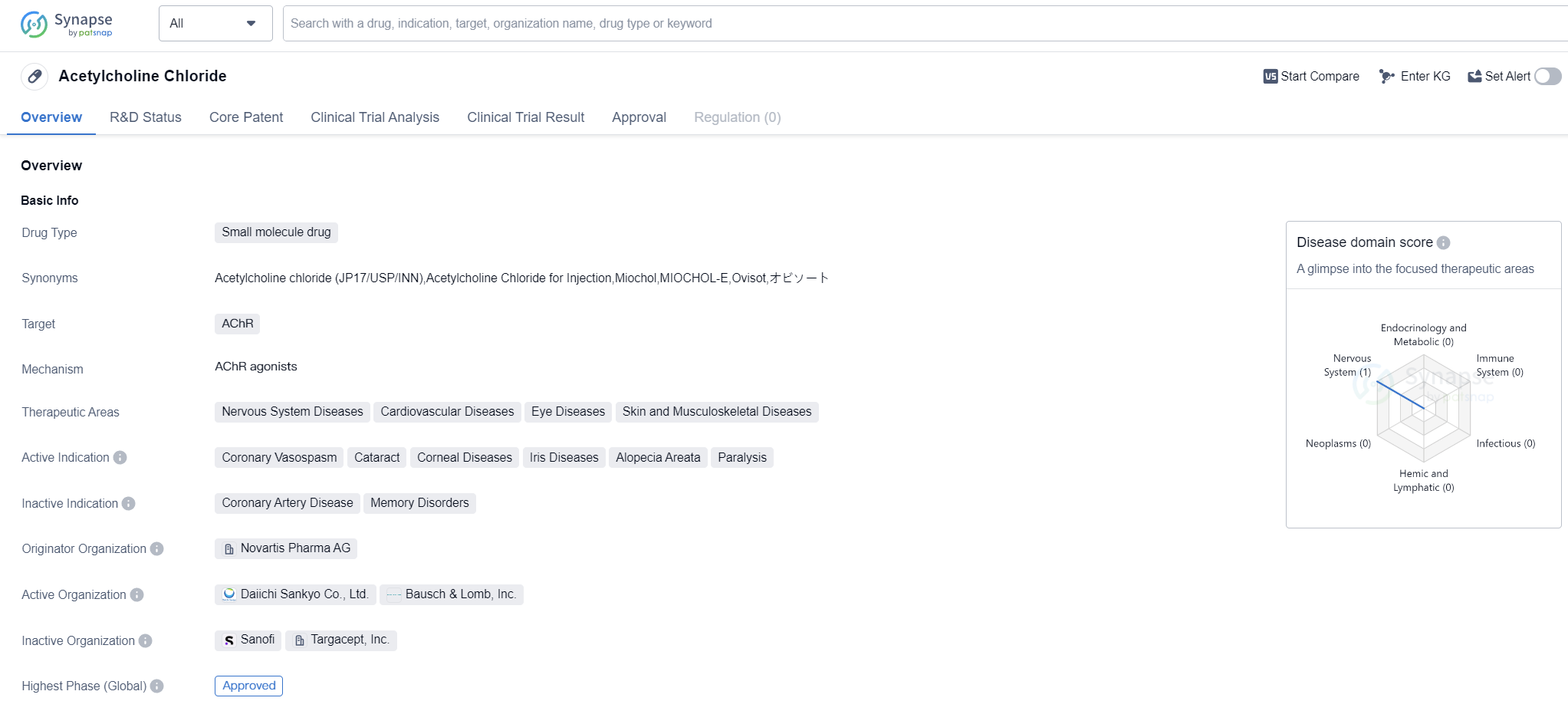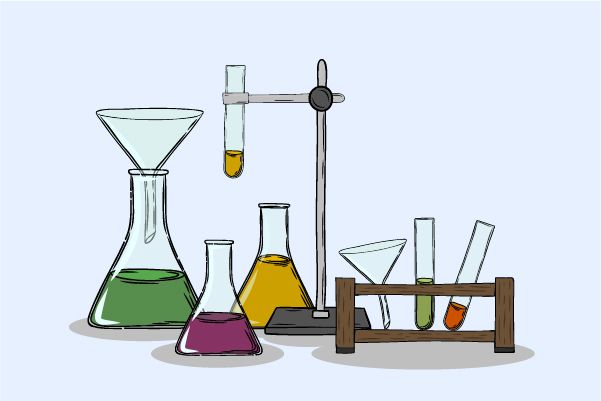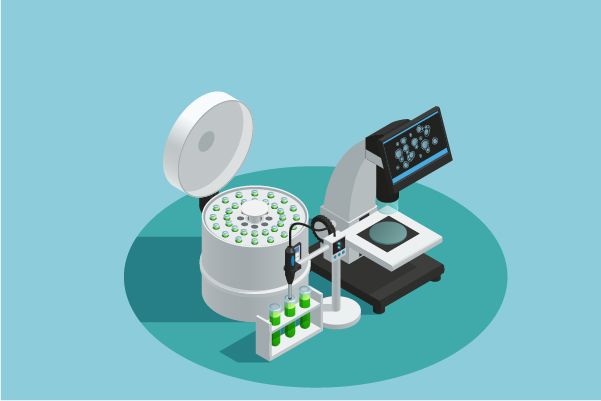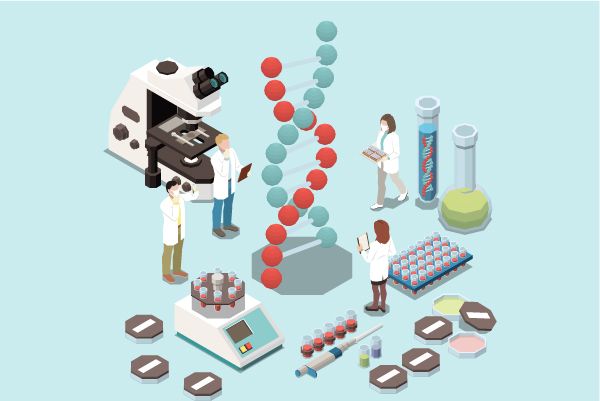Deep Scientific Insights on acetylcholine chloride's R&D Progress, Mechanism of Action, and Drug Target
Acetylcholine chloride's R&D Progress
Acetylcholine Chloride is a small molecule drug that targets the AChR (acetylcholine receptor). It has been approved for use in the treatment of various diseases related to the nervous system, cardiovascular system, eye, and skin and musculoskeletal system. The drug has shown efficacy in treating conditions such as coronary vasospasm, cataract, corneal diseases, iris diseases, alopecia areata, and paralysis.
The drug was first approved in the United States in October 1973, making it one of the earliest approved drugs in the field of biomedicine. The highest R&D phase of this drug is approved.
Acetylcholine Chloride is developed by Novartis Pharma AG, a renowned pharmaceutical organization known for its contributions to the healthcare industry. Novartis Pharma AG is the originator organization of this drug, implying that they were responsible for its initial discovery and development.
The drug's therapeutic areas highlight its potential to address a wide range of diseases affecting different systems of the body. Nervous system diseases, such as paralysis, can benefit from the drug's ability to target the acetylcholine receptor. Cardiovascular diseases, including coronary vasospasm, may also be treated with Acetylcholine Chloride. Additionally, the drug has shown promise in the treatment of eye diseases like cataract, corneal diseases, and iris diseases. It is also indicated for skin and musculoskeletal diseases, such as alopecia areata.
👇Please click on the image below to directly access the latest data (R&D Status | Core Patent | Clinical Trial | Approval status in Global countries) of this drug.
Mechanism of Action for acetylcholine chloride: AChR agonists
AChR agonists are a type of medication or substance that activate or stimulate the acetylcholine receptors (AChR) in the body. Acetylcholine receptors are proteins found on the surface of cells, particularly in the nervous system, and they play a crucial role in transmitting signals between nerve cells. When AChR agonists bind to these receptors, they mimic the action of acetylcholine, a neurotransmitter responsible for transmitting signals in the nervous system.
From a biomedical perspective, AChR agonists are commonly used in the treatment of various medical conditions related to the dysfunction of acetylcholine receptors. For example, in the context of neuromuscular disorders like myasthenia gravis, where there is a decrease in the number or function of AChRs, AChR agonists can help enhance the transmission of nerve signals to muscles, improving muscle strength and function.
Additionally, AChR agonists can also be utilized in research and experimental studies to study the role of acetylcholine receptors in different physiological processes or to develop new therapeutic strategies. By selectively activating AChRs, scientists can gain insights into the mechanisms underlying various diseases and potentially identify novel drug targets.
Overall, AChR agonists are substances that activate acetylcholine receptors, and they have important applications in both clinical medicine and scientific research.
Drug Target R&D Trends for acetylcholine chloride
The acetylcholine receptor (AChR) plays a crucial role in the human body as it is responsible for mediating the effects of acetylcholine, a neurotransmitter involved in various physiological processes. AChR is a transmembrane protein found on the surface of cells, particularly in the nervous system, skeletal muscles, and other tissues. It functions as a ligand-gated ion channel, allowing the passage of ions across the cell membrane upon binding with acetylcholine. This receptor is essential for muscle contraction, nerve signal transmission, and cognitive functions. Dysregulation or dysfunction of AChR can lead to various disorders, including myasthenia gravis and Alzheimer's disease.
According to Patsnap Synapse, as of 13 Sep 2023, there are a total of 41 AChR drugs worldwide, from 58 organizations, covering 53 indications, and conducting 223 clinical trials.
The analysis of the current competitive landscape of target AChR reveals that multiple companies are actively involved in the research and development of drugs targeting this receptor. Bausch Health Cos., Inc., AbbVie, Inc., and Alcon AG are among the companies with the highest stage of development for drugs targeting AChR. The approved drugs under this target cover a wide range of indications, including primary axillary hyperhidrosis, muscle hypertonia, Alzheimer's disease, and others. Small molecule drugs are progressing rapidly, indicating their dominance in the development of AChR-targeted therapeutics. The United States, Japan, China, and the European Union are the leading countries/locations in terms of drug development for this target. Overall, the analysis suggests a competitive landscape with diverse drug types and indications, indicating the potential for future advancements in the field of AChR-targeted pharmaceuticals.
👇Please click on the picture link below for free registration or log in directly if you have a freemium account, you can browse the latest research progress on drugs, indications, organizations, clinical trials, clinical results, and drug patents related to this target
Conclusion
Overall, Acetylcholine Chloride is a small molecule drug that has been approved for use in various therapeutic areas. Its ability to target the acetylcholine receptor makes it a potential treatment option for diseases affecting the nervous system, cardiovascular system, eye, and skin and musculoskeletal system. Developed by Novartis Pharma AG, this drug has a long history of use, with its first approval dating back to 1973 in the United States.






